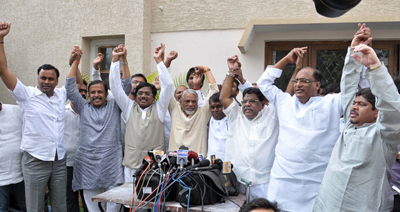
Hyderabad/ New Delhi, Aug 2: Two days after the UPA-Cong nod for formation of separate Telangana state, Andhra Pradesh plunged into a political crisis with a spate of resignations by elected representatives of Rayalaseema and coastal Andhra regions, including three ministers.
After hours of discussions at Chief Minister Kiran Kumar Reddy’s camp office, three Seemandhra ministers T G Venkatesh, Erasu Pratap Reddy and Ganta Srinivasa Rao submitted their resignations to their cabinet posts to the CM.
Twenty MLAs and 9 MLCs from ruling Congress and 16 MLAs from Opposition TDP also faxed their resignation letters to oppose bifurcation of the state even as mass protests rocked Rayalaseema and coastal Andhra, jointly referred to as Seemandhra.
Meanwhile in Delhi, at least three MPs from Seemandhra region were on the verge of quitting their Parliament seats.
Six members of Parliament -- Lagadapati Rajagopal, K Bapiraju, A Sai Prathap, V Arun Kumar, Anantrami Reddy and G V Harsha Kumar met late night to deliberate on the future course of action. Sources said that Rajagopal, Prathap and Reddy were on the verge of quitting. Rajagopal said the MPs would meet tomorrow forenoon to pursue the matter.
Union Ministers J D Seelam, D Purandeshwari, Killi Kruparani and M M Pallam Raju were also at the meeting AICC secretary RC Khuntia has been despatched by the Congress high command to broker peace with the agitating MPs.
A key demand of the Seemandhra leaders is that they want Hyderabad to be made a Union Territory or be made a permanent joint capital of Telangana and the residual state of Andhra Pradesh.
The group is also learnt to have made a demand to merge two districts of Anantpur and Kurnool of Rayalaseema region with Telangana.
Of the AP?MLAs who quit, K Sudhakar, Ugranarsimha Reddy, Muralikrishna, Daggubati, J C Diwakar Reddy, Adinarayana Reddy, Kamalamma and Anam Ramanarayana Reddy submitted their resignation letters to Speaker Malladi Vishnu, Usharani, Nageswar Rao, Venkat Reddy, Venkataramaiah, Kethireddy, Vellampalli Srinivas, Kothapalli, Kannababu and Vanga Geetha gave their resignations to APCC chief Botsa Satyanarayana.
MLCs Sudhakar Babu, Rudraraju and Mohammad Jani submitted their resignations to the Speaker, Paladugu, Gade V Naidu and Tippeswamy submitted to APCC chief.
Demanding that the Congress Working Committee (CWC) reverse its decision to divide the state, the Ministers and MLAs from Seemandhra threatened to join the public protests and intensify the movement for the cause of united AP.
“We are not bothered if our resignations lead to imposition of President’s rule on the state,” senior Congress MLA from coastal Andhra region, G Venkat Reddy, said.
“We have realised that our leaders understand our feelings only if there is an agitation. Because we have been peaceful and have not resorted to any agitation, the state has been divided,” former minister J C Diwakar Reddy said after a meeting of legislators from the two regions.
Ministers in dilemma
A delegation of 19 Seemandhra ministers met Chief Minister Kiran Kumar Reddy in the evening to tender resignation letters and made it clear they would not go against the will of the people of their region.
Interestingly, the CM?also hails from Seemandhra and his strong opposition to the state’s bifurcation is well known.
However, he said he would abide by the party high command’s decision.
The Chief Minister and APCC chief along with two AICC observers Tirunavakarasu and Mr Kuntia tried to convince the angry cabinet colleagues not to precipitate the matters by quitting their posts.
However three ministers Raghuveera Reddy, Kanna Laxminarayana and C Ramachandraiah stayed away from meeting CM.
In all, 12 ministers reportedly expressed their desire to quit.
TDP’s loss
Sixteen TDP legislators mostly from Krishna, Guntur and Anantapur districts, resigned despite their party chief Nara Chandrababu Naidu supporting the bifurcation of the state.
Meanwhile, AP NGOs who have organised rallies in the state secretariat for two days, announced that they would go on indefinite strike from August 5.





Comments
Add new comment